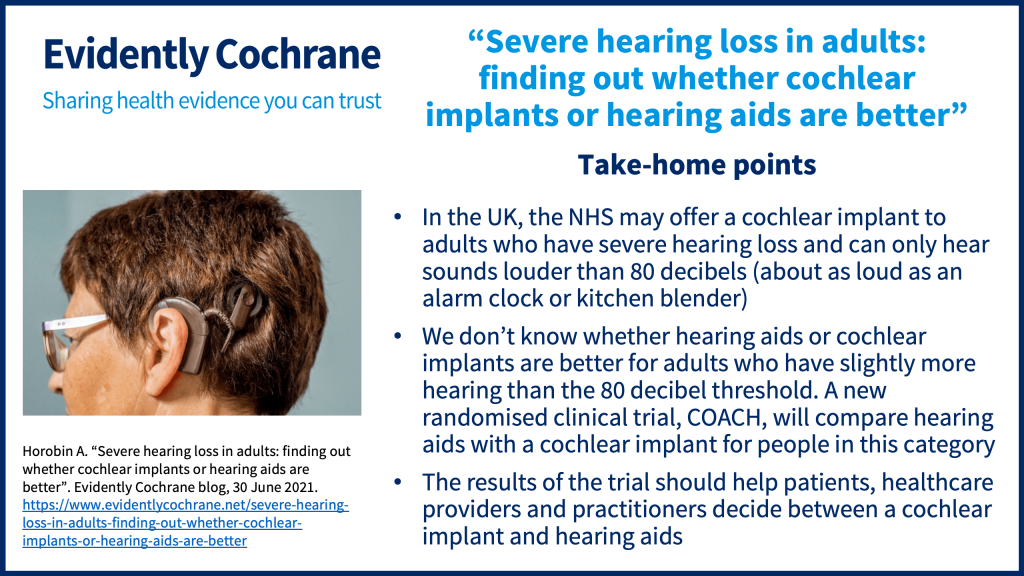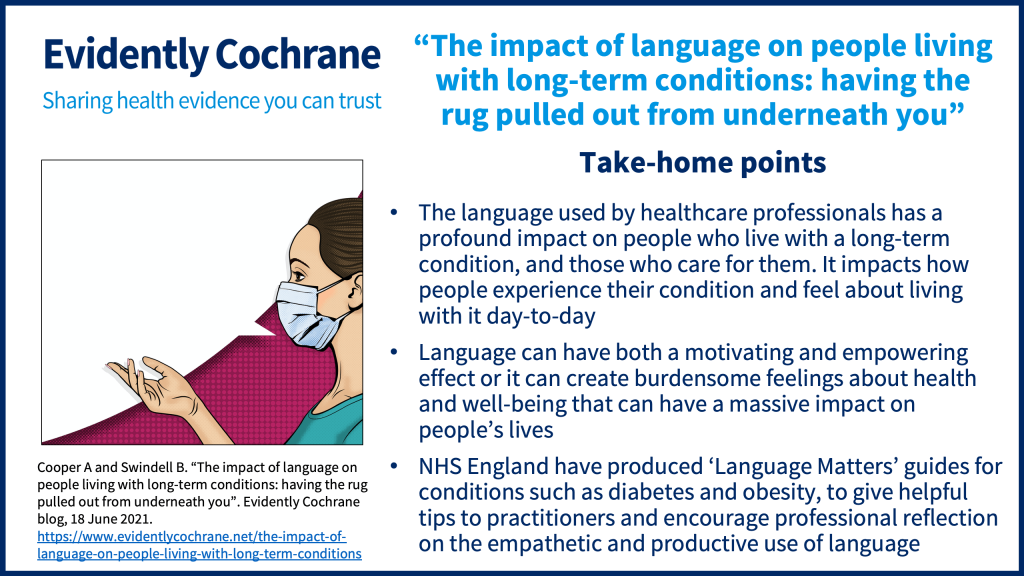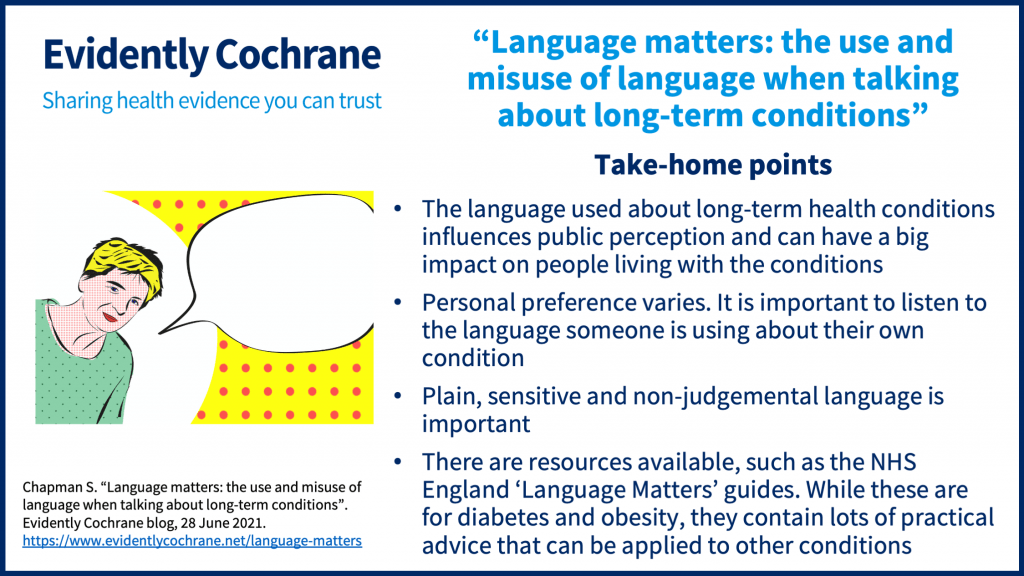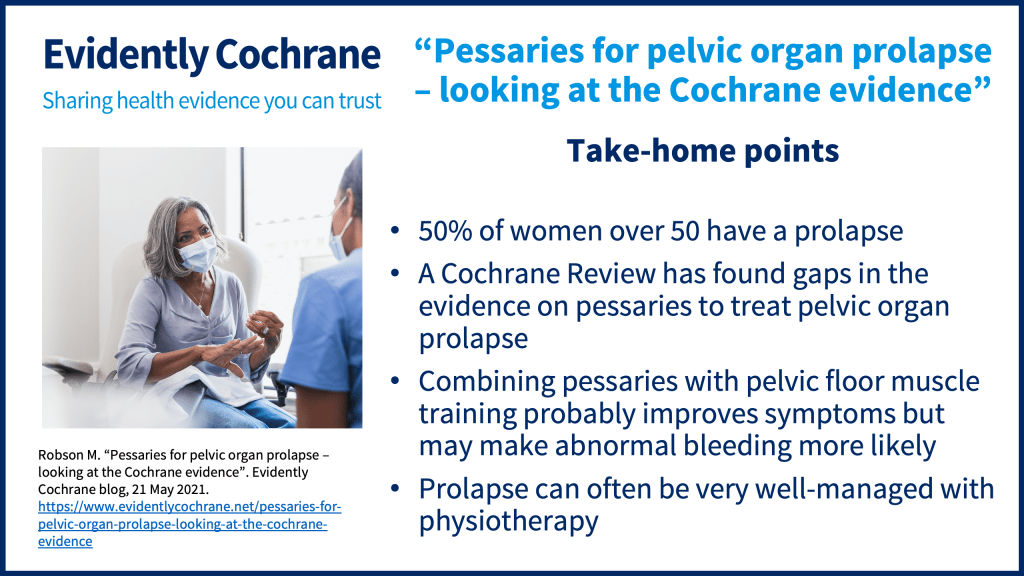The latest evidence and resources for allied health professionals and clinical support staff. You can either scroll through this page or click on any of the links below to jump to the relevant section.
Please note, unlike the rest of our blogs, our ‘Evidence for Allied Health: new evidence and resources’ blogs will not be updated.
-
- COVID-19
- Asthma
- Cancer
- Care of the newborn, including preterm infants
- COPD
- Critical and emergency care
- Dementia
- Dietary interventions
- End-of-life care
- Healthcare worker education and training
- Living with long-term conditions
- Low back pain
- Occupational Therapy research priorities
- Pelvic health
- Post-operative care
- Pulmonary embolism
- Pulmonary rehabiliation
- Soft tissue injury (acute)
- Smoking cessation
- Stroke
- Vitamin D supplementation for children
- Opportunities to get involved with Cochrane
COVID-19
.
COVID-19
This year, Cochrane is continuing to produce new and updated reviews in response to the pandemic. We have blogged about many of them and this blog COVID-19 evidence: a Cochrane round-up brings together a large collection of evidence and resources, starting from when this evidence was first being produced in spring 2020. Like the reviews themselves, all our blogs are updated to reflect new evidence.
A Cochrane Review COVID‐19 and its cardiovascular effects: a systematic review of prevalence studies (March 2021) has looked at both cardiovascular problems pre-existing the development of COVID-19 and assesses the risk of cardiovascular complications, highlighting which are the most common (unexpectedly, this was atrial fibrillation). Senior author Professsor John GF Cleland discusses it in this interview. He comments that “These results show what the clinical teams looking after patients with COVID should watch out for. Clinical teams are already aware of the risk of blood clots but may be less aware of the risk of developing atrial fibrillation or heart failure. Also, heart failure may be difficult to diagnose in a patient with COVID, so great care and attention is required not to miss this treatable diagnosis.” There is a Cochrane Clinical Answer and a Cochrane Podcast for this review.
Cochrane’s response to the pandemic had to meet the needs of evidence users and decision‐makers as it developed and how this is being done is discussed in an Editorial COVID-19: working together and making a difference for decision-makers. Cochrane has also signed on to the World Health Organization’s call for action about managing infodemics and WHO’s Vaccine Equity Declaration.
Cochrane Special Collections
Cochrane Special Collections assemble Cochrane Reviews on important topics for the prevention and treatment of COVID-19. They are developed with experts from our global Cochrane network. They are based on World Health Organization interim guidance, and continuously updated. You can find Coronavirus (COVID-19) Special Collections here. Among them is the other (non-Covid) Special Collections is Physical activity for healthy ageing which was updated in April 2021.
Cochrane Podcasts
Cochrane COVID-19 Podcasts offer short summaries of Cochrane COVID-19 reviews from the authors themselves. A good way to hear the latest Cochrane evidence in under 5 minutes each.
Cochrane Clinical Answers
Cochrane Clinical Answers (CCAs) provide a readable, digestible, clinically-focused entry point to rigorous research from Cochrane Reviews. They are designed to be actionable and to inform point-of-care decision-making.
Each CCA contains a clinical question, a short answer, and data for the outcomes from the Cochrane Review deemed most relevant to practising healthcare professionals. The evidence is displayed in a user-friendly tabulated format that includes narratives, data, and links to graphics.
You can find Cochrane Clinical Answers related to COVID-19 here.
Asthma
Inhaled corticosteroids for chronic asthma
Cochrane Review: Regular treatment with formoterol and an inhaled corticosteroid versus regular treatment with salmeterol and an inhaled corticosteroid for chronic asthma: serious adverse events (April 2021)
Cochrane Clinical Answers (both derived from the above review):
Inhalers for mild asthma
Featured Review: Combination fixed-dose beta agonist and steroid inhaler as required for adults or children with mild asthma
Cancer
Breast cancer
Cochrane Clinical Answer: Can weight loss interventions improve outcomes for overweight and obese breast cancer survivors?
Glioblastoma
Podcast: Treatment options for newly diagnosed glioblastoma in older people
Care of the newborn, including preterm infants
Management of transient tachypnoea of the newborn
For this recent Cochrane Review: Fluid restriction in the management of transient tachypnea of the newborn (February 2021) there is now a Cochrane Clinical Answer: How does restricted fluid management compare with standard fluid management for preventing transient tachypnea in neonates?
Opioids for ventilated newborns
Podcast: Opioids for newborns receiving mechanical ventilation
Surfactant therapy
Cochrane Review: Surfactant therapy via thin catheter in preterm infants with or at risk of respiratory distress syndrome (May 2021)
COPD
For this Cochrane Review Prophylactic antibiotics for adults with chronic obstructive pulmonary disease: a network meta‐analysis (January 2021) there is now a Cochrane Clinical Answer: For adults with chronic obstructive pulmonary disease (COPD), how do prophylactic antibiotics compare?
Critical and emergency care
Critical care telemedicine
Cochrane Clinical Answer: What characteristics associated with interventions, individuals, and in‐hospital settings affect the implementation of critical care telemedicine (CCT)?
High-flow nasal cannulae
Cochrane Review: High‐flow nasal cannulae for respiratory support in adult intensive care patients (March 2021)
Cochrane Clinical Answer: For adults in intensive care requiring respiratory support, how does a high‐flow nasal cannula compare with standard oxygen therapy and non‐invasive (positive‐pressure) ventilation (NI[PP]V)?
Oral hygiene
Podcast: Oral hygiene care for critically ill patients to prevent ventilator-associated pneumonia
PEEP levels for mechanically ventilated adults
Cochrane Review: High versus low positive end‐expiratory pressure (PEEP) levels for mechanically ventilated adult patients with acute lung injury and acute respiratory distress syndrome (March 2021)
Cochrane Clinical Answer: How do high and low positive end‐expiratory pressure (PEEP) levels compare for mechanically ventilated adults with acute lung injury and acute respiratory distress syndrome?
Dementia
Podcast: Cochrane Dementia and Cognitive Improvement Group dispels myths on podcast
Dietary interventions
Crohn’s disease
Cochrane Clinical Answers:
Cystic fibrosis
Cochrane Clinical Answer: What are the benefits and harms of oral calorie supplements for people with cystic fibrosis?
Hypertension plus overweight or obesity
Cochrane Review: Long‐term effects of weight‐reducing diets in people with hypertension (February 2021)
Cochrane Clinical Answer: For people with hypertension and overweight or obesity, what are the effects of weight‐reducing diets?
Cochrane Clinical Answer: How does intermittent fasting compare with ad libitum and continuous energy restriction dietary styles for prevention of cardiovascular disease in adults?
End-of-life care
Hospital at home
Cochrane Review: Hospital at home: home‐based end‐of‐life care (March 2021)
Cochrane Clinical Answers:
For terminally ill adults, how does home‐based end‐of‐life care compare with usual care?
Hospital-based specialist palliative care
Cochrane Clinical Answer: How does hospital‐based specialist palliative care (HSPC) affect adults with advanced illness?
Healthcare worker education and training
Education and training for preventing sharps injuries and splash exposures in healthcare workers (April 2021)
Training healthcare providers to respond to intimate partner violence against women (May 2021). See also our blog Domestic abuse: help and evidence for abused women and those supporting them.
Living with long-term conditions
Living with long-term conditions: a Cochrane UK special series has multiple blogs, offering perspectives from patients, health professionals and researchers. You can read all the blogs in this series here. Some are listed elsewhere on this page by topic (eg. mental health, diabetes). Our Consumer Champions have shared their experiences in Living with a long-term condition: five perspectives – part 1 and Living with a long-term condition: five perspectives – part 2. There is a blog on research to improve pregnancy outcomes for women with long-term conditions – Contemplating pregnancy with long-term health conditions and a blog on biologics for treating arthritis: are they the greatest advance this century?
There is a blog on a new trial comparing hearing aids with cochlear implants – Severe hearing loss in adults: finding out whether cochlear implants or hearing aids are better.

There is also a blog on The impact of language on people living with long-term conditions and a tweetchat on this topic is summarised in this blog Language matters: the use and misuse of language when talking about long-term conditions.

Low back pain
Low back pain
Cochrane Clinical Answer: Can adding acupuncture to usual care improve outcomes for adults with chronic nonspecific low back pain?
Occupational Therapy research priorities
The Occupational Therapy JLA PSP published its Top 10 research priorities in July 2020. Here, you can read about the Next steps for the Top 10 research priorities in Occupational Therapy.
Pelvic health
Myra Robson, a pelvic health physiotherapist, has written an Evidently Cochrane blog Pessaries for pelvic organ prolapse – looking at the Cochrane evidence.
NICE seek comments on draft guidance on pelvic floor dysfunction
NICE has recently published draft guidance on pelvic floor dysfunction and the importance of exercises and has opened a period of consultation from stakeholders, until 9 August 2021.
Post-operative care
Featured review: What are the benefits and risks of a single injection of ketorolac (an anti-inflammation medicine) for relieving short-term pain after surgery in adults? (May 2021)
Cochrane Clinical Answer: For adults with acute postoperative pain, how does single‐dose intravenous (IV) ketorolac compare with alternative non‐steroidal anti‐inflammatory drugs (NSAIDs) or opioids?
Pulmonary embolism
Cochrane Review: Thrombolytic therapy for pulmonary embolism (April 2021)
Pulmonary rehabilitation
Soft tissue injury (acute)
Cochrane Clinical Answer: How do oral non‐steroidal anti‐inflammatory drugs compare with other oral analgesic agents for people with acute soft tissue injury?
Smoking cessation
Cochrane Special Collections:
Coronavirus (COVID-19): effective options for quitting smoking during the pandemic (June 2021)
Stopping tobacco use (May 2021)
Cochrane Clinical Answer: How effective and safe are electronic cigarettes (ECs) for smoking cessation?
Stroke
Featured Review: Endovascular thrombectomy and intra‐arterial interventions for acute ischaemic stroke
Cochrane Clinical Answer: How do oral health interventions compare with usual care for improving outcomes in people after stroke?
Vitamin D supplementation for children
For the Cochrane Review Effects of oral vitamin D supplementation on linear growth and other health outcomes among children under five years of age(December 2020) there is now a Cochrane Clinical Answer For infants and children younger than 5 years of age, what are the effects of vitamin D supplementation on linear growth and other health outcomes?
Opportunities to get involved with Cochrane
On this page, Important Cochrane Links, you can find opportunities to get involved, including how to join Cochrane, find volunteer tasks, or jump into the Cochrane Library.
Find out more about Cochrane’s Early Career Professionals Group and their upcoming activities.
Please note that this page includes a round-up of materials mainly published within the last three months, and is not updated after it’s posted.
Join in the conversation on Twitter with @SarahChapman30 and @CochraneUK or leave a comment on the blog.
Please note, we cannot give medical advice and do not publish comments that link to individual pages requesting donations or to commercial sites, or appear to endorse commercial products. We welcome diverse views and encourage discussion but we ask that comments are respectful and reserve the right to not publish any we consider offensive. Cochrane UK does not fact check – or endorse – readers’ comments, including any treatments mentioned.




